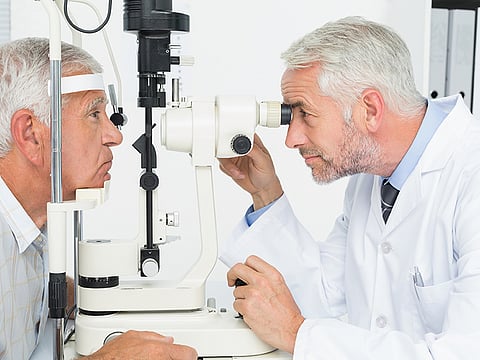Diabetes can cause irreversible blindness
Current statistics indicate that nearly 19.3 per cent of UAE residents suffer from diabetes

Dubai: As the world observed Global Sight Day on October 8, opthalmologists in Dubai expressed concerns over the rise of irreversible blindness caused by diabetes retinopathy, owing to a rise in diabetes in the UAE.
Explaining the etymology of the disease, Dr Tareq Younus, Specialist Opthalmologist at Medcare Hospital’s Eye Centre, said: “Diabetic retinopathy is caused due to high sugar in the blood that leads to swelling in the blood vessels in the eye, which results in them leaking fluid into the retina and destroying he nerve fibres, leading to progressive loss of eyesight and eventually irreversible blindness.”
Current statistics indicate that nearly 19.3 per cent of UAE residents suffer from diabetes and Dr Younus pointed out that nearly 19 per cent of these suffer from retinopathy. “There are nearly 756,000 diagnosed diabetics in the UAE, and there are about 300,000 undiagnosed diabetics. Studies indicate that nearly 86 per cent of Type I diabetics get retinopathy while 33 per cent of Type II get it. However, what is really dangerous is that nearly one third of these people are unaware about the disease, which can be prevented and slowed down with early intervention.”
Listing out the top five reasons of irreversible blindness, Dr Abdullah Naqi, ophthalmologist and acting head of the department of ophthalmology in Dubai Hospital said: “While diabetes retinopathy remains the leading cause of irreversible blindness, the other four are:
1. Glaucoma
2. Age-related macular degeneration
3. Trauma to the eye owing to accidents
4. Progressive reduction of vision due to Amblyopia (lazy eye) and Keratoconus Cornea (thinning and bulging of cornea).
Dr Naqi emphasised the importance of early intervention and treatment of this condition by quoting the findings of a Diabetes Control and Complication Trial (DCCT). He pointed out in this trial that every patient who was examined in a 20-year period showed some sign of diabetic retinopathy, those who maintained their HbA1C (three-month indicator of blood sugar levels) below 7 and had early intervention had very slow deterioration of the condition. “People who had high blood sugar and neglected regular eye check-ups had a severe form of retinopathy.”
Prevention and Treatment
Cessation of smoking, a balanced diet, regular diabetes medication, regular physical activity and blood pressure control are some of the important measures that a patient can act upon to reduce the impact of diabetes on the nerve endings in the eye. “There is a chance of reversal of the disease if a patient comes to us in time. We usually have Argon laser treatment, which reduces the complication of retinopathy by destroying the unhealthy blood vessels that cause liquids to leak into the eye. Besides the laser there are special injections that can stop the deterioration of the blood vessels and in advanced cases we use vitrectomy where the vitreous gel is removed surgically and the retina repaired by the surgeon.
Sign up for the Daily Briefing
Get the latest news and updates straight to your inbox


